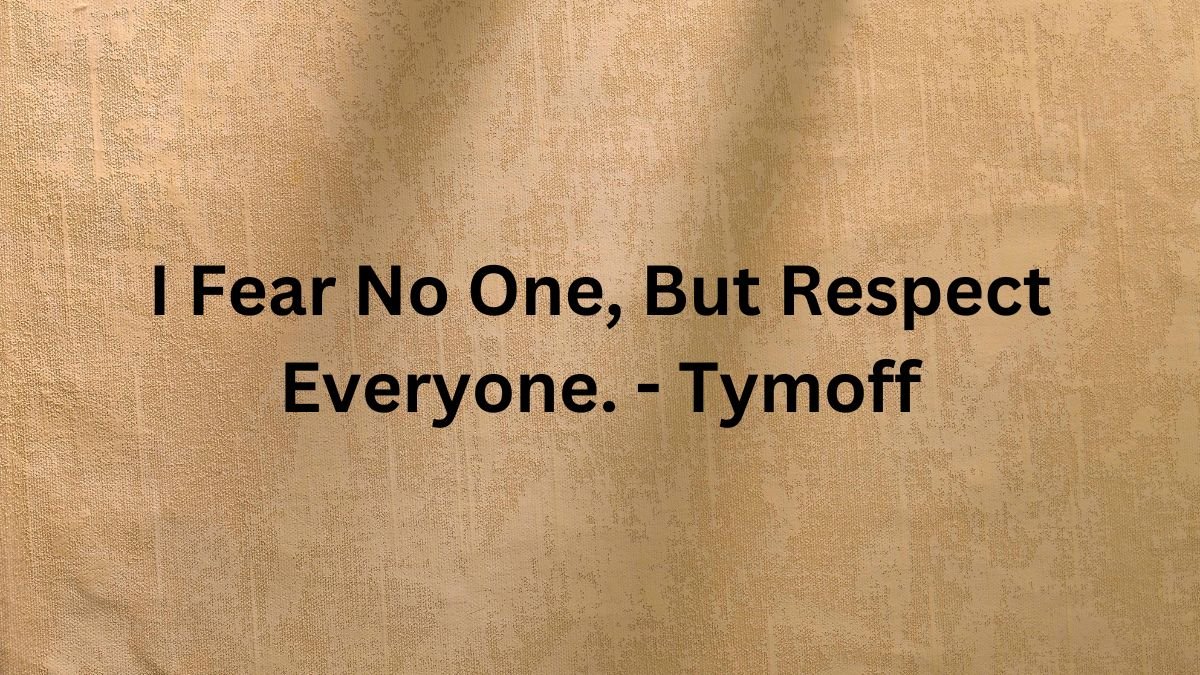
I Fear No One, But Respect Everyone. – Tymoff
In a world filled with fear and uncertainty, one man stands tall with an unwavering belief in respect above all else. Tymoff‘s mantra, “I fear no one, but respect everyone,” serves as a powerful reminder of the strength that comes from treating others with dignity and understanding. Join us as we delve into the wisdom behind this simple yet profound philosophy and discover how it can shape our interactions with those around us.
Introduction to I Fear No One, But Respect Everyone. – Tymoff
The emotions of fear and respect are often seen as opposite ends of a spectrum, where one represents vulnerability and the other represents strength. However, in reality, these two emotions are interconnected and play a crucial role in our daily lives. In this section, we will explore the concept of fear and respect, their definitions, and how they can coexist within us.
Fear is an innate human emotion that is triggered by a perceived threat or danger. It can manifest as physical sensations such as increased heart rate, sweating, or trembling. Fear can also lead to behavioral responses like fight or flight reactions. It is a primitive survival mechanism that has helped humans protect themselves from harm throughout evolution.
On the other hand, respect is a feeling of admiration towards someone or something based on their qualities or achievements. It involves recognizing the worthiness of an individual or an idea. Respect can be earned through actions that demonstrate integrity, kindness, competence, among others.
While fear seems to be associated with weakness and respect with strength, both emotions have their own positive aspects. Fear can act as a warning sign in dangerous situations and motivate us to take necessary precautions. Similarly, respect allows us to learn from others’ experiences and accomplishments while also fostering healthy relationships.
In some cases, fear can even lead to admiration for someone’s bravery or resilience in overcoming challenges. This admiration eventually turns into respect for that person’s courage and determination.
Moreover, there are instances where both fear and respect coexist simultaneously towards the same person or situation. For example, you might feel fearful yet respectful while interacting with your boss due to their authority but also acknowledging their hard work and leadership skills.
It is essential to understand that both these emotions are natural human responses that serve different purposes in different scenarios. Our perception of them may vary depending on our past experiences and beliefs; however it is important not to let either one dominate our actions and decisions.
In the upcoming sections, we will delve deeper into how fear and respect can impact our relationships, both personal and professional. We will also explore ways to maintain a balance between these emotions to lead a fulfilling life.
Explanation of the quote by Tymoff (I Fear No One, But Respect Everyone. – Tymoff)
Tymoff’s quote, “I fear no one, but respect everyone,” is a powerful statement that speaks to the importance of having confidence in oneself while also acknowledging the value and worth of others. In today’s world, where competition and egos often drive people to belittle or undermine others, this quote serves as a reminder to maintain a balance between self-assurance and humility.
To truly understand the depth and meaning behind Tymoff’s words, we must first break down each part of the quote. The first half, “I fear no one,” can be interpreted in two ways. On one hand, it could mean that Tymoff has overcome any fears he may have had in his life and now approaches every situation with bravery and courage. This interpretation suggests that Tymoff has reached a level of self-confidence where he no longer allows fear to hold him back.
On the other hand, “I fear no one” could also mean that Tymoff does not let anyone intimidate or control him through fear tactics. This interpretation suggests that Tymoff stands tall in the face of adversity and refuses to give anyone power over him. He is unshakable in his convictions and does not allow himself to be swayed by external pressures.
The second half of the quote, “but respect everyone,” emphasizes the importance of showing respect towards others regardless of their status or position. It serves as a reminder that every person deserves basic human decency and should be treated with kindness and consideration.
By combining these two phrases together, Tymoff is highlighting the idea that we can have unwavering confidence without resorting to arrogance or disrespect towards others. Instead, we should strive for a healthy balance between self-assurance and humility.
Moreover, this quote challenges us to examine our own beliefs about power dynamics in society. Often times, people associate strength with dominating others or being feared by them. However, Tymoff’s quote challenges this notion by suggesting that true strength lies in being fearless and showing respect towards everyone.
Tymoff’s quote is a powerful reminder to approach life with courage and confidence while also treating others with kindness and respect. It encourages us to break free from societal norms and expectations, and instead, forge our own path based on our values and principles. Let us all strive to embody the essence of this quote in our daily lives, fearlessly pursuing our dreams while also nurturing positive relationships with those around us.
Read Also: It Is Not Wisdom But Authority That Makes A Law. T – Tymoff
How this mindset can benefit individuals and society
Having a mindset of fearlessness and respect towards others can bring significant benefits to both individuals and society as a whole. In this section, we will explore how this powerful mindset can positively impact our personal growth and contribute to creating a better world.
Firstly, the fearlessness aspect of this mindset allows individuals to break free from their comfort zones and take on new challenges without hesitation. Fear often holds us back from pursuing our dreams and goals, but with a fearless attitude, we are more likely to take risks and step out of our comfort zones. This can lead to personal growth and development as we push ourselves beyond our limits and discover new strengths and abilities within us.
Moreover, having respect for everyone also plays a crucial role in building strong relationships with others. When we treat people with respect regardless of their background or status, it creates a sense of trust and understanding between individuals. This can lead to stronger friendships, partnerships, and collaborations which ultimately benefit not only the individuals involved but also society as a whole.
Furthermore, this mindset promotes empathy towards others. Instead of judging or belittling someone based on their differences or mistakes, individuals with this mindset choose understanding and compassion. This allows for smoother communication, conflict resolution, and promotes inclusivity in society.
Another benefit of having both fearlessness and respect is that it cultivates a positive attitude towards diversity. Instead of fearing those who are different from us, we learn to embrace diversity as an essential part of society. This helps break down barriers between different cultures, races, genders, religions etc., promoting harmony among people from all walks of life.
On a larger scale, this mindset has the potential to create ripple effects that contribute to societal change. By being fearless yet respectful towards others’ opinions and beliefs, individuals can promote open-mindedness in society. This encourages healthy debates instead of conflicts based on narrow-mindedness or prejudice.
Personal experiences with implementing this mindset
Personal experiences with implementing this mindset can be both challenging and rewarding. As someone who has struggled with fear and self-doubt, adopting the mantra of “fearing no one but respecting everyone” has been a game changer in my life.
One of the biggest challenges I faced when first trying to implement this mindset was letting go of my own insecurities. It’s easy to fall into the trap of comparing ourselves to others and feeling inferior. But by shifting my focus from fearing others to simply respecting them, I was able to let go of these negative thoughts and truly appreciate the unique qualities that each person brings to the table.
Another challenge I faced was learning how to assert myself without being aggressive or confrontational. This mindset is not about being passive or weak; it’s about recognizing that we are all equals and treating others with respect regardless of their status or position. I had to learn how to communicate effectively while still maintaining a sense of respect for those around me.
But as I continued to practice this mindset, I began noticing positive changes in my relationships and interactions with others. By removing fear from the equation, I was able to approach conversations and situations with a level head and open mind. This allowed for more meaningful connections and productive discussions.
Furthermore, by focusing on respecting others rather than fearing them, I found myself becoming more empathetic and understanding towards different perspectives. Instead of judging or dismissing someone because they held different beliefs or opinions, I made an effort to listen and try to understand where they were coming from.
This mindset also helped me overcome my fear of failure. By embracing respect for others, I also learned how important it is to have self-respect. Rather than dwelling on past mistakes or worrying about potential failures, I focused on continuously improving myself while remaining respectful towards others.
Ultimately, implementing this mindset has not only transformed my relationships with those around me but also improved my relationship with myself. It has taught me the power of respect and how it can lead to a more fulfilling and confident life. I encourage anyone struggling with fear or self-doubt to give this mindset a try – you may be surprised at the positive impact it can have on your life.
Read Also: The 1982 Movie Poltergeist Used Real Skeletons As – Tymoff
The importance of setting boundaries while still showing respect
Setting boundaries while still showing respect is crucial for maintaining healthy and positive relationships with others. Boundaries are limits that we set for ourselves in order to maintain our physical, emotional, and mental well-being. They define what is acceptable and unacceptable behavior from others towards us.
One of the main reasons why setting boundaries is important is because it helps us establish a sense of self-worth and self-respect. When we have clear boundaries, we are communicating to others that our needs and values matter. It also shows that we are aware of our own limitations and are not willing to compromise on them.
Furthermore, setting boundaries can prevent us from feeling overwhelmed or taken advantage of in any relationship. Without proper boundaries, people may take advantage of our kindness or availability, leading to feelings of resentment or burnout. By setting clear limits on what we can handle or how much time we can give, we protect ourselves from being drained emotionally or physically.
In addition, setting boundaries promotes open communication and healthier interactions with others. When we communicate our boundaries effectively, it allows others to understand where they stand with us and encourages them to do the same. This can lead to more harmonious relationships built on mutual understanding and respect.
It’s important to note that setting boundaries does not mean being disrespectful or rude towards others. Respect should always be maintained while establishing these limits. This means clearly communicating your needs without attacking or belittling the other person’s feelings or opinions.
Moreover, having clear boundaries also teaches others how to treat us with respect. When we consistently enforce our limits, people learn that they cannot disregard them without consequences. This ultimately leads to more respectful interactions as people become conscious of each other’s personal space and needs.
Setting boundaries allows us to prioritize our own well-being above all else. In today’s fast-paced world where there seems to be an endless amount of demands placed upon us by work, family, friends, and society, it’s easy to neglect our own needs. However, by setting boundaries, we are creating a space for ourselves where we can recharge and take care of our physical, mental, and emotional health.
Setting boundaries while still showing respect is crucial for maintaining healthy relationships with others as well as ourselves. It allows us to establish our self-worth and avoid feeling overwhelmed or taken advantage of. By communicating clearly and respectfully, we can promote open communication and healthier interactions with those around us. Most importantly, setting boundaries allows us to prioritize our own well-being and maintain a balanced life.
Read Also: Learn To Sit Back And Observe. Not Everything Need – Tymoff
Examples of when it is appropriate to fear someone and how to handle it
When it comes to fear, it is a natural human emotion that we all experience at some point in our lives. It can be triggered by various situations, and one of the most common causes of fear is other people. We may encounter individuals who intimidate us or make us feel unsafe, leading to feelings of fear towards them.
So when is it appropriate to fear someone? Here are a few examples:
- Physical Threat: If someone poses a physical threat to you, whether through their words or actions, it is appropriate to feel afraid. This could be in the form of bullying, harassment, or even violence. In such cases, it is crucial to prioritize your safety and take necessary precautions.
- Manipulation and Control: People who use manipulation and control tactics can also evoke feelings of fear in others. They may use their power or authority over you to make you do things against your will or harm you emotionally. It is essential to recognize these behaviors and find ways to protect yourself from such individuals.
- History of Violence: If someone has a history of aggression or violence towards you or others, it is understandable that you would feel fearful around them. Their past behavior indicates that they are capable of causing harm again, which can be a valid reason for your fear.
- Personal Boundaries Being Crossed: When someone continuously violates your personal boundaries without respecting your consent, it can create an atmosphere of discomfort and unease around them. This can lead to feelings of fear as well as anger towards the individual.
Now that we have explored some situations where feeling afraid towards someone might be justified let’s discuss how we can handle this fear effectively:
- Set Boundaries: One way to handle fear towards someone is by setting clear boundaries with them regarding what behavior is acceptable and what isn’t. Communicate these boundaries assertively while also being respectful.
- Seek Support: It’s always helpful to confide in someone you trust and seek their support when dealing with fear. This could be a friend, family member, or even a professional therapist who can provide guidance and help you cope with your emotions.
- Trust Your Instincts: If an individual gives you a gut feeling of fear, it’s essential to listen to it. Our instincts often warn us of potential danger, so it’s crucial to take heed of them rather than dismissing them.
- Practice Self-Care: Taking care of yourself is crucial when dealing with fear towards someone. Engage in activities that bring you joy and make you feel safe and secure. This will help alleviate your anxiety and give you the strength to handle any difficult situations that may arise.
While we should strive to respect everyone, there are instances where feeling afraid towards someone is justified. It’s important to acknowledge these feelings, set boundaries, seek support, trust our instincts, and practice self-care when handling fear towards others. Remember that your safety and well-being should always come first in any situation involving fear towards someone else.
Read Also: Love What You Have, Before Life Teaches You To Lov – Tymoff
Discussion on respecting oneself and others regardless of differences
Respecting oneself and others, regardless of differences, is a crucial aspect of leading a fulfilling and harmonious life. In today’s diverse society, it is essential to understand that everyone comes from different backgrounds, beliefs, and perspectives. However, these differences should not be a hindrance in treating each other with kindness and respect.
Firstly, it is crucial to recognize the importance of self-respect. Before we can respect others, we must first learn to respect ourselves. This involves having high self-esteem and confidence in our abilities and values. When we respect ourselves, we are more likely to set boundaries and standards for how we want to be treated by others. It also allows us to have a positive outlook on life and be more accepting of others’ differences.
Furthermore, respecting others regardless of their differences requires us to have an open mind and empathy towards them. We must understand that everyone has their own unique experiences that shape their perspectives and actions. By showing empathy towards others, we can put ourselves in their shoes and gain a better understanding of where they are coming from. This can help bridge any gaps or misunderstandings between individuals from different backgrounds.
Moreover, it is essential to remember that every individual deserves basic human decency and respect simply because they are human beings. No one should be discriminated against or treated unfairly based on their race, gender identity, sexual orientation, religion or any other personal characteristic. We must strive towards creating an inclusive society where everyone feels valued and respected for who they are.
Additionally, respecting oneself and others also means being mindful of our words and actions towards one another. It is easy to let our emotions get the best of us during disagreements or conflicts with those who hold different views than ours. However, it is vital to communicate respectfully without resorting to insults or derogatory language. By doing so, we can maintain healthy relationships with people despite our differences.
Respecting oneself and others regardless of differences is a crucial aspect of living in a diverse society. It requires us to have self-respect, empathy, open-mindedness, and mindfulness in our interactions with others. By practicing respect towards ourselves and others, we can create a more harmonious and accepting world where everyone feels valued and appreciated.
Read Also: Self-Control Is Strength. Calmness Is Mastery. You – Tymoff
Practical tips for incorporating this mindset into daily life
Incorporating a fearless and respectful mindset into your daily life can be challenging, but with some practical tips and strategies, it is possible. Here are some ways you can cultivate this powerful attitude in your everyday interactions:
- Start with self-reflection: The first step to incorporating this mindset is to reflect on your own beliefs and attitudes towards fear and respect. Ask yourself why you fear certain individuals or situations, and if that fear is justified. Similarly, examine how you show respect to others and whether it aligns with your values. This self-awareness will help you identify any areas for improvement.
- Focus on understanding rather than judging: Fear often stems from a lack of knowledge or understanding about someone or something. Instead of judging based on assumptions, make an effort to understand the person or situation better by asking questions and listening attentively. This will not only decrease your fear but also show respect for the other person’s perspective.
- Practice empathy: Empathy is the ability to put oneself in another’s shoes and understand their feelings and experiences. When interacting with others, try to see things from their point of view instead of just your own. This will foster mutual respect and create a deeper connection between you.
- Set boundaries: While showing respect to everyone is important, it doesn’t mean that you should tolerate disrespectful behavior towards yourself. Learn to set boundaries and stand up for yourself when needed while still maintaining an overall attitude of respect towards others.
- Use positive affirmations: Incorporating positive affirmations into your daily routine can help shift your mindset from one of fear to one of confidence and courage. Repeat statements like “I am fearless” or “I treat everyone with respect” throughout the day as a reminder of the attitude you want to embody.
- Surround yourself with like-minded individuals: It’s said that we become like the people we spend time with most often, so choose your company wisely. Surround yourself with people who share a similar mindset and values of fearlessness and respect. Their positive energy and support will help reinforce your own beliefs.
- Practice gratitude: Gratitude is a powerful tool for shifting our perspective from fear to appreciation. Make it a habit to express gratitude daily, whether through journaling, meditation, or simply saying thank you to those around you. This will cultivate a sense of peace and positivity within yourself, making it easier to adopt an attitude of respect towards others.
Incorporating this fearless and respectful mindset into your daily life may not happen overnight, but with consistency and determination, you can make it a natural part of who you are. Remember that everyone deserves respect, including yourself, and by living by this principle you can create more meaningful connections and interactions in your life.
Read Also: How I Sleep At Night Knowing I’m Failing All My Cl – Tymoff
Conclusion about I Fear No One, But Respect Everyone. – Tymoff
The power of respect is truly remarkable. It has the ability to bridge differences, build strong relationships, and create a harmonious environment for all. In today’s fast-paced world, where competition and individualism often take center stage, the value of respect can easily be overlooked. However, it is an essential virtue that should never be underestimated.
Respect goes beyond just being polite or courteous; it involves acknowledging and honoring the worth and dignity of every person we encounter. This includes showing consideration for their thoughts, feelings, beliefs, and boundaries. When we approach others with respect, we are essentially recognizing their humanity and treating them as equals.
One of the most powerful aspects of respect is its ability to break down barriers between individuals from different backgrounds or beliefs. It allows us to see beyond our own perspectives and empathize with others who may hold different opinions or come from different cultures. By respecting one another’s differences, we can foster understanding and promote unity within our communities.
In addition to building connections with others, practicing respect also has a positive impact on ourselves. When we treat others with kindness and consideration, it not only reflects positively on our character but also boosts our self-esteem. Respectful behavior fosters a sense of confidence in ourselves knowing that we are capable of treating others with dignity regardless of any potential conflicts or differences.
Moreover, respect sets an example for future generations by promoting inclusivity and tolerance in society. As parents, teachers, mentors – it is crucial to instill the value of respect in young minds so that they too can carry this virtue forward and contribute towards creating a more respectful world.
While fear may often motivate us to comply with societal norms or authority figures’ expectations- true change comes from a place of mutual respect amongst individuals. The power of respect lies in its ability to transcend boundaries and bring people together despite their differences. Let us strive to cultivate a culture where everyone feels valued and respected, and we can truly create a world where no one fears anyone but respects everyone.



